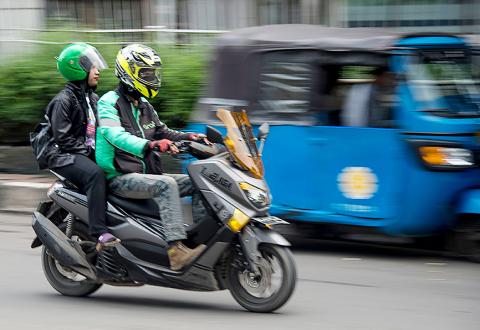Auto-rickshaw driver Zainuddin used to make decent money navigating Jakarta’s congested roads and narrow alleyways.
However, now US-based Uber Technologies Inc, Google-backed PT Go-Jek Indonesia and Singapore’s Grab are locked in a race for ride-hailing app supremacy in Southeast Asia’s biggest economy, denting the fortunes of traditional three-wheeled bajaj taxis that once ruled Indonesia’s roads.
“Our income has fallen to between 70 and 80 percent since ride-hailing apps came on the scene,” said Zainuddin, who like many Indonesians goes by one name.

Photo: AFP
There were about 14,000 bajaj on Indonesia’s roads by 2015, according to the latest official figures.
By contrast, Go-Jek alone claims 900,000 drivers and about 15 million weekly active users. It launched in 2010.
Singapore’s sovereign wealth fund Temasek Holdings Pte and Google have announced investments in Go-Jek, which has been valued at as much as US$5 billion although it is little known outside Asia.
Southeast Asia’s ride-hailing market more than doubled in two years to about US$5 billion last year and it is expected to reach US$20 billion by 2025, with Indonesia set to account for about 40 percent of it, according to research done by Google and Temasek.
The ride-hailing trio offer fixed-price rides that take haggling out of the equation, a welcome change for former bajaj customer Tetty Iskandar.
“I haven’t taken a bajaj in years,” said the 35-year-old housewife, who used to ride the three-wheelers to go grocery shopping. “You had to bargain with the drivers to get cheap fares and you would already have done a lot of bargaining in the market. Sometimes I felt so tired and just wanted to get home.”
The vast archipelago of about 260 million people has a relatively low per capita car ownership rate and vehicle owners often choose to leave their ride at home, opting instead for a fixed-price motorcycle that can zip through Jakarta’s epic traffic congestion — at bargain-basement prices.
That is threatening bajaj — not to mention regular cabs and ubiquitous motorbike taxis known as ojek — which arrived in Indonesia during the 1970s. The motorized rickshaw quickly made inroads under its namesake company, which hailed from India.
The name bajaj is now inked into Jakarta’s lexicon after supplanting traditional bicycle taxis. A distinctive blue model of the vehicle is still a common sight and while pollution-spewing older models are outlawed, some still ply the narrow alleyways of Indonesia’s sprawling capital.
Government efforts to reduce traffic snarls by reintroducing bicycle taxis could further chip away at the market share of bajaj, which cannot operate on highways and certain busy streets.
Still, bajaj backers say the little tuk-tuk is safer than a motorcycle, which has higher injury and fatality rates.
“They are still a very useful means of transport when you have to go through small alleys and roads in Jakarta,” said Danang Parikesit, president of the Indonesia Transportation Society think tank.
Despite the threat of technology, some insist bajaj have a future, especially among customers who do not want to get soaked on the back of a motorbike, or while waiting for a hired car during the months-long rainy season.
“Customers don’t like to get wet,” tuk-tuk driver Zainuddin said. “It’s not good for people when the rain comes, but bajaj drivers will be happy.”

POWERING UP: PSUs for AI servers made up about 50% of Delta’s total server PSU revenue during the first three quarters of last year, the company said Power supply and electronic components maker Delta Electronics Inc (台達電) reported record-high revenue of NT$161.61 billion (US$5.11 billion) for last quarter and said it remains positive about this quarter. Last quarter’s figure was up 7.6 percent from the previous quarter and 41.51 percent higher than a year earlier, and largely in line with Yuanta Securities Investment Consulting Co’s (元大投顧) forecast of NT$160 billion. Delta’s annual revenue last year rose 31.76 percent year-on-year to NT$554.89 billion, also a record high for the company. Its strong performance reflected continued demand for high-performance power solutions and advanced liquid-cooling products used in artificial intelligence (AI) data centers,

SIZE MATTERS: TSMC started phasing out 8-inch wafer production last year, while Samsung is more aggressively retiring 8-inch capacity, TrendForce said Chipmakers are expected to raise prices of 8-inch wafers by up to 20 percent this year on concern over supply constraints as major contract chipmakers Taiwan Semiconductor Manufacturing Co (TSMC, 台積電) and Samsung Electronics Co gradually retire less advanced wafer capacity, TrendForce Corp (集邦科技) said yesterday. It is the first significant across-the-board price hike since a global semiconductor correction in 2023, the Taipei-based market researcher said in a report. Global 8-inch wafer capacity slid 0.3 percent year-on-year last year, although 8-inch wafer prices still hovered at relatively stable levels throughout the year, TrendForce said. The downward trend is expected to continue this year,

A proposed billionaires’ tax in California has ignited a political uproar in Silicon Valley, with tech titans threatening to leave the state while California Governor Gavin Newsom of the Democratic Party maneuvers to defeat a levy that he fears would lead to an exodus of wealth. A technology mecca, California has more billionaires than any other US state — a few hundred, by some estimates. About half its personal income tax revenue, a financial backbone in the nearly US$350 billion budget, comes from the top 1 percent of earners. A large healthcare union is attempting to place a proposal before

Vincent Wei led fellow Singaporean farmers around an empty Malaysian plot, laying out plans for a greenhouse and rows of leafy vegetables. What he pitched was not just space for crops, but a lifeline for growers struggling to make ends meet in a city-state with high prices and little vacant land. The future agriculture hub is part of a joint special economic zone launched last year by the two neighbors, expected to cost US$123 million and produce 10,000 tonnes of fresh produce annually. It is attracting Singaporean farmers with promises of cheaper land, labor and energy just over the border.